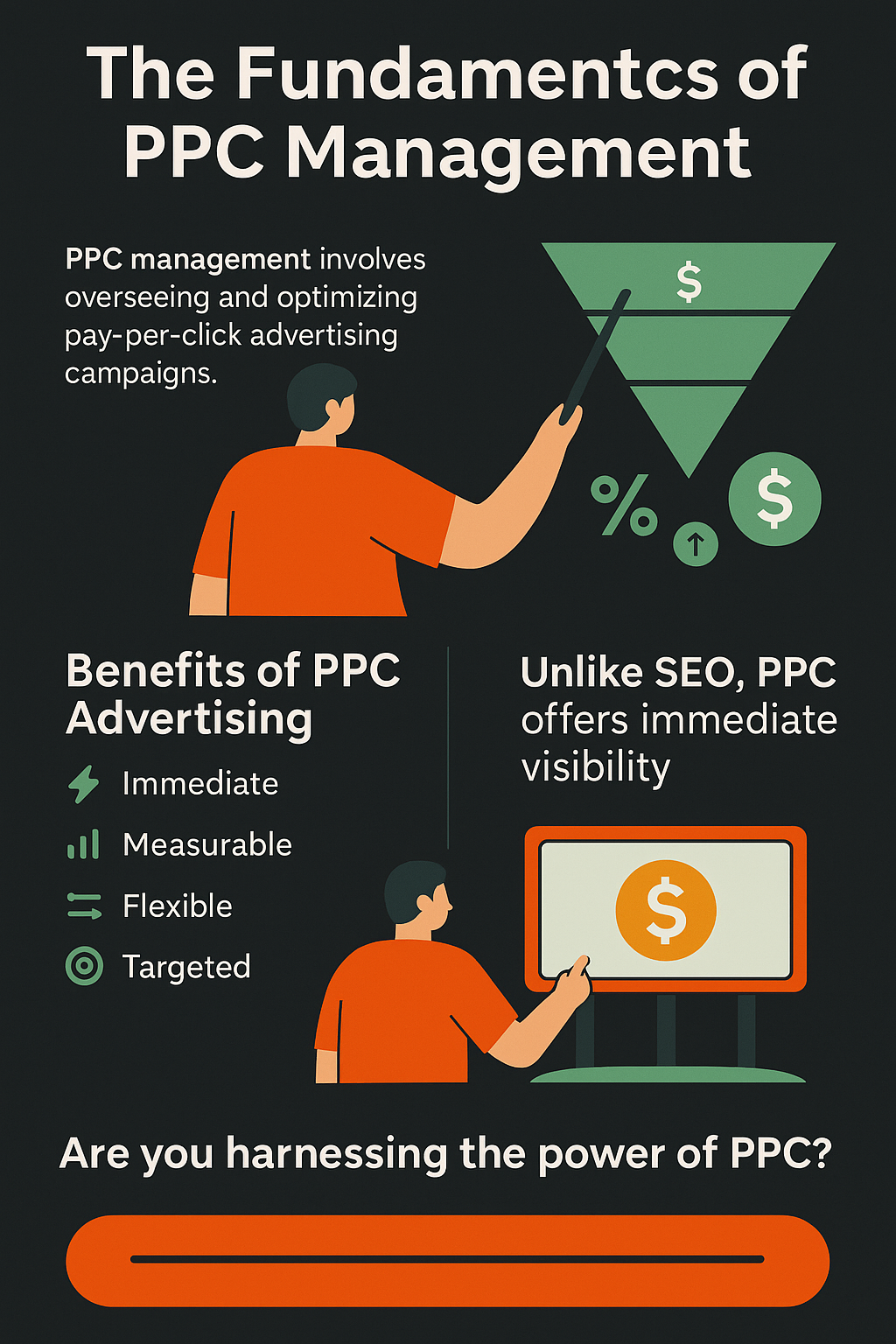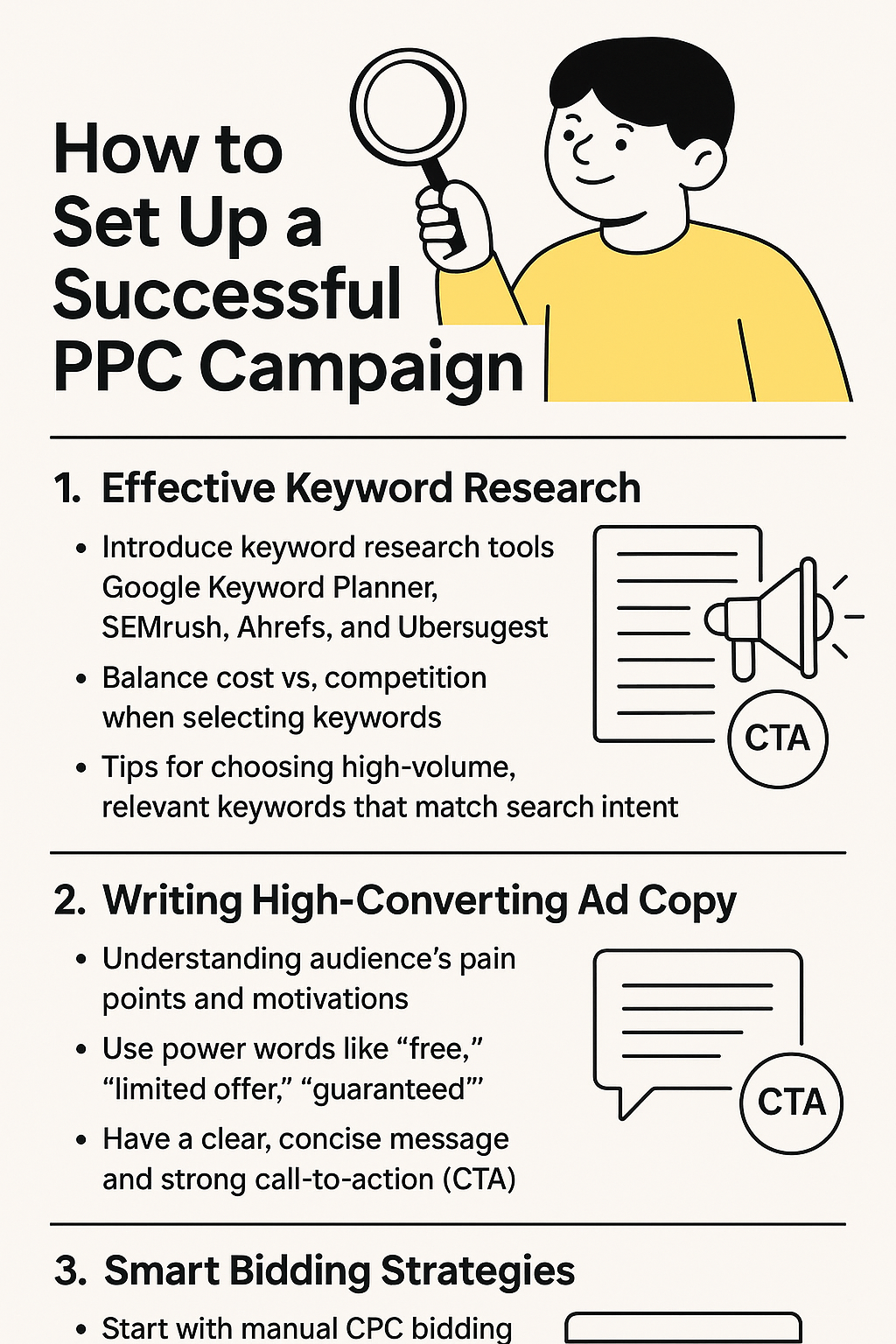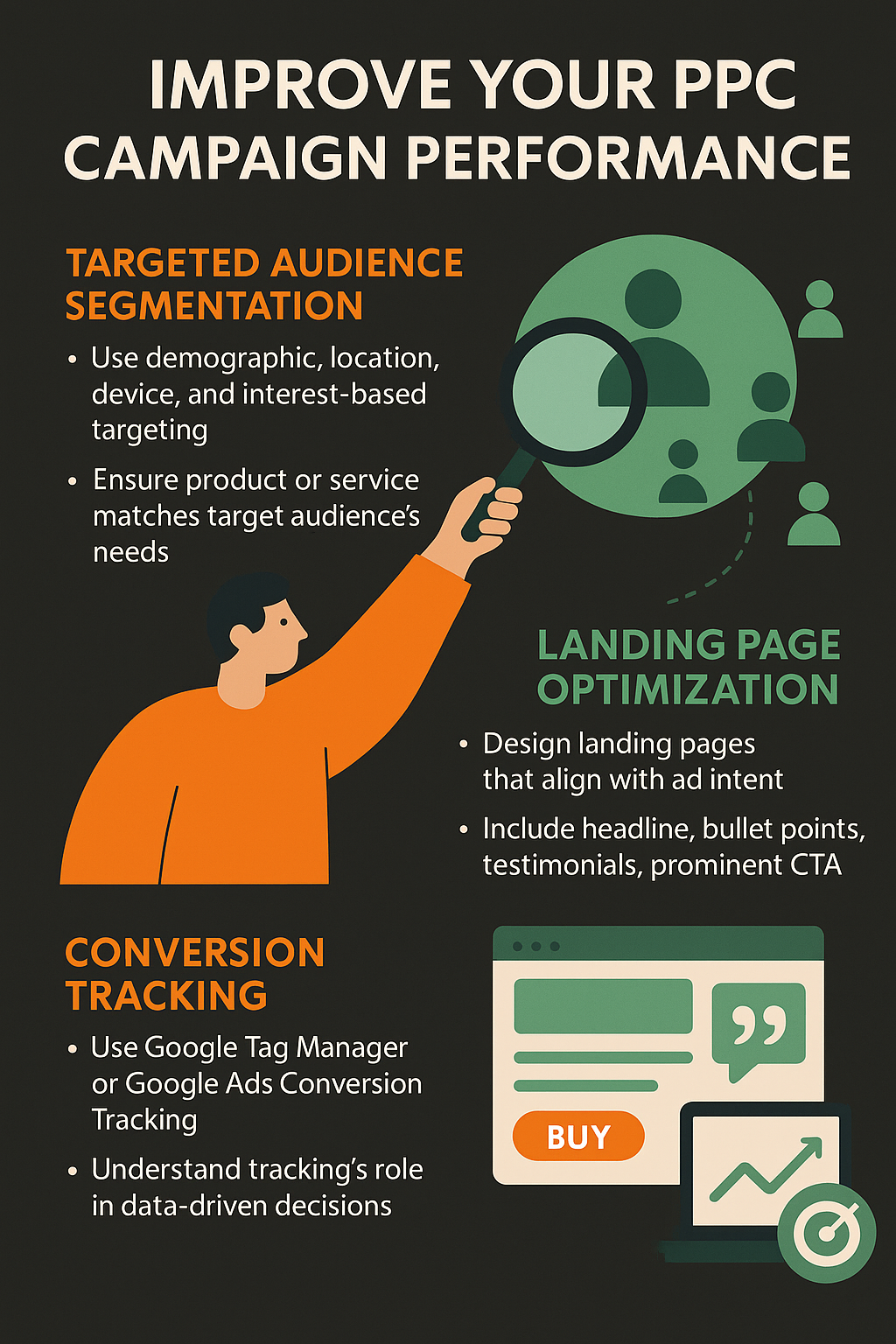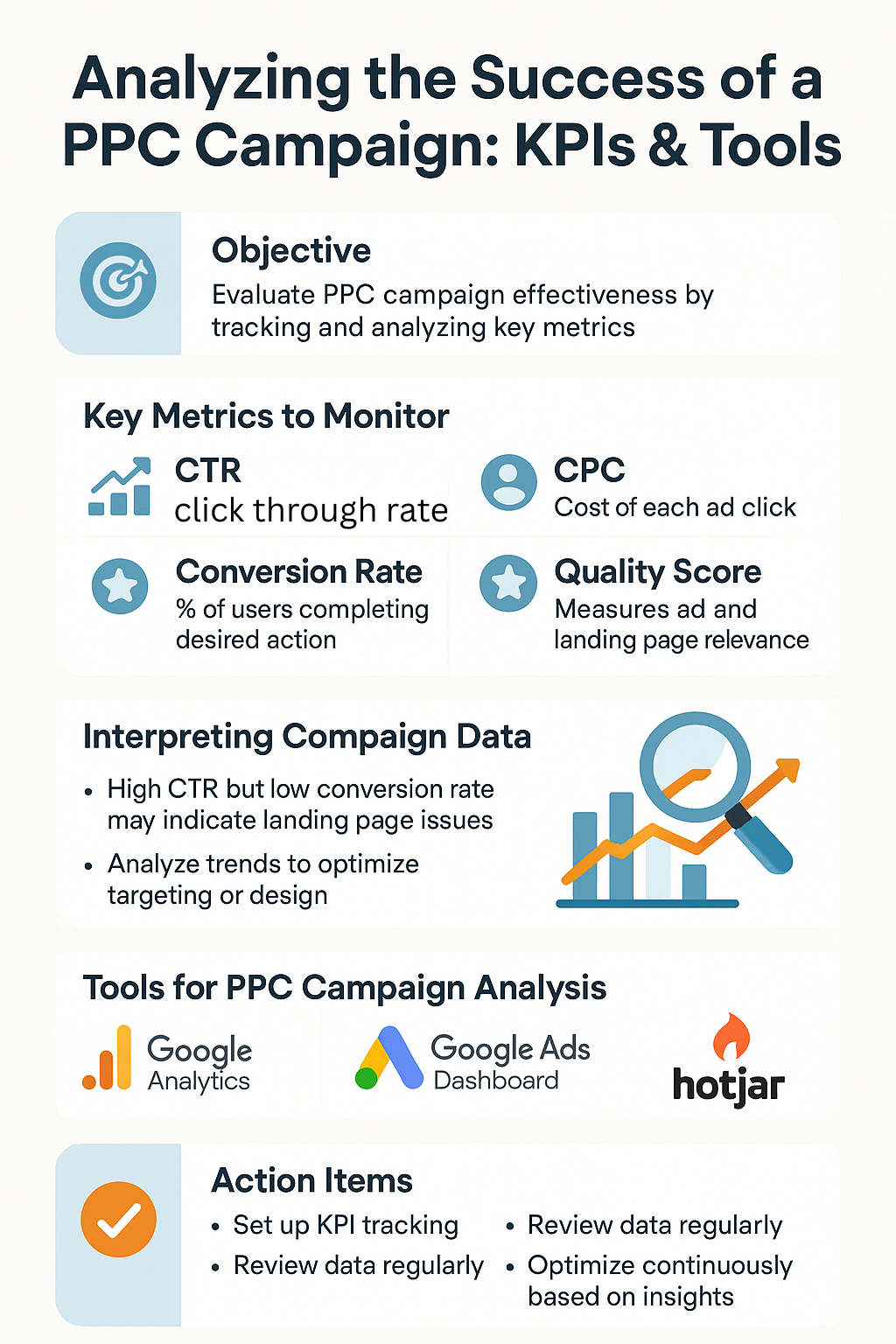Understanding the Fundamentals of PPC Management
What is PPC Management?
PPC management, or pay-per-click management, is the process of overseeing and optimizing paid ad campaigns on platforms like Google Ads, Bing, and social media. You only pay when someone clicks on your ad—hence the name. Think of it like renting a digital billboard where you’re charged only when someone walks up and takes a look.
Why PPC is Essential in Digital Marketing
PPC advertising is immediate. Unlike SEO which takes time, PPC can drive traffic and leads right now. It’s measurable, flexible, and highly targeted—making it a must-have in your digital advertising strategies.

Setting Up a Successful PPC Management Campaign
Effective Keyword Research for PPC
Choosing the right keywords is half the battle. You want terms that your potential customers are actually searching for—but that also balance cost and competition.
Tools for Keyword Research
- Google Keyword Planner – A go-to tool for finding high-volume keywords.
- SEMrush & Ahrefs – Great for competitive keyword analysis.
- Ubersuggest – Budget-friendly and insightful for long-tail terms.
Writing High-Converting Ad Copy
Your ad copy needs to speak directly to your target audience’s pain points and desires. Use power words like free, limited offer, or guaranteed. Keep it short, clear, and persuasive. Always include a strong CTA like “Get a Quote” or “Shop Now.”
Smart Bidding Strategies That Work
Start with manual CPC if you’re a beginner to retain control. As you get data, test automated bidding like Target ROAS or Maximize Conversions. Set a daily budget, and monitor performance consistently.

Optimizing Your PPC Campaign for Maximum ROI
Audience Targeting and Segmentation
Not everyone is your customer. Use demographics, location, device, and interests to narrow down who sees your ad. For example, if you sell luxury watches, don’t target budget shoppers.
Landing Page Optimization Tips
Clicking the ad is just half the journey. Your landing page must match the ad’s intent. Use a clear headline, bullet points, testimonials, and a CTA button above the fold.
Conversion Tracking Essentials
Use Google Tag Manager or Google Ads Conversion Tracking to see what’s working. Without tracking, it’s like shooting arrows in the dark.
Common Mistakes to Avoid in PPC Management Campaign
Poor Keyword Targeting
Avoid broad keywords that eat up your budget without delivering results. Use match types like “Phrase Match” and “Exact Match” for better control.
Ignoring Ad Quality Score
Google assigns a score to your ads based on relevance, CTR, and landing page quality. Low scores = higher costs and fewer impressions.
Not Monitoring Competitor Ads
Always keep an eye on what your competitors are doing. Tools like SpyFu or Adbeat give you insights into their strategies.

Measuring and Analyzing PPC Campaign Success
Key Metrics to Track in Pay-per-Click Advertising
- CTR (Click-Through Rate)
- CPC (Cost Per Click)
- Conversion Rate
- Quality Score
- ROAS (Return on Ad Spend)
How to Interpret Campaign Data
Numbers tell a story. A high CTR but low conversion rate? Your ad is interesting, but the landing page needs work.
Tools for PPC Campaign Analysis
- Google https://support.google.com/analytics/answer/10089681?hl=enAnalytics
- Google Ads Dashboard
- Hotjar (for landing page behavior analysis)

AdWords Management Best Practices
Structuring Your Campaigns Properly
Group similar keywords into tightly themed ad groups. This improves Quality Score and reduces CPC.
A/B Testing Ad Variations
Test different headlines, descriptions, and CTAs. Keep the winner, scrap the loser. Always be testing!
PPC Campaign Optimization Tactics
Geo-targeting and Device Optimization
Focus on where your ideal customers live and what devices they use. For instance, a mobile repair shop may want to target mobile users within a 10-mile radius.
Using Negative Keywords Effectively
Add irrelevant search terms as negative keywords to avoid wasting money. For example, if you sell luxury bags, “cheap bags” should be negative.
Google Pay Per Click: How to Succeed with Google Ads
Setting Up Google Ads the Right Way
Choose the right campaign type (Search, Display, Shopping), define your goals clearly, and set your targeting precisely.
Budget Allocation Tips for Google Ads
Start small, analyze performance, and scale what works. Don’t throw your entire budget at untested campaigns.

Digital Advertising Strategies That Convert
Combining PPC with SEO
PPC brings quick traffic, SEO builds long-term authority. Together, they dominate the SERPs.
Leveraging Retargeting for Higher ROI
Ever notice ads following you around after you visit a website? That’s retargeting. It boosts conversion by reminding users to come back and buy.
Online Marketing Management Integration
Coordinating PPC with Social Media Campaigns
Align your PPC goals with what you’re promoting on Facebook, Instagram, or LinkedIn. Cross-channel consistency is key.
Using CRM Data to Improve PPC
Upload your customer list to Google Ads for Customer Match, then target similar users with Lookalike Audiences.
Scaling Your PPC Campaigns
When and How to Increase Budget
Only scale what’s working. Increase your budget gradually on high-ROAS campaigns.
Automation Tools for PPC Growth
Try tools like Optmyzr, WordStream, or Google’s Performance Max to automate bids, testing, and reporting.
Case Studies and Real-Life PPC Success Stories
A small bakery in NYC spent $300/month on PPC and generated $2,000+ in revenue from targeted birthday cake ads. The secret? Hyper-local targeting and mouth-watering ad creatives.
Final Thoughts on PPC Management
PPC management isn’t just about throwing money at ads—it’s about being strategic, analytical, and constantly optimizing. With the right approach, PPC can drive consistent, high-quality traffic and revenue for any business.
FAQs on PPC Management
1. What is the difference between PPC and SEO?
PPC is paid traffic where you pay per click; SEO is organic traffic gained by optimizing your content for search engines.
2. How much should I spend on PPC?
It depends on your goals, industry, and competition. Start small, analyze, and scale smartly.
3. What platforms are best for PPC?
Google Ads is the most popular. Others include Bing Ads, Facebook Ads, Instagram Ads, and LinkedIn Ads.
4. Can PPC help a new website?
Absolutely! PPC drives immediate traffic and helps build brand awareness while your SEO matures.
5. How long does it take to see PPC results?
You can start seeing traffic within hours. However, significant ROI may take days or weeks of testing and optimization.
7. How can YourDigiHelp assist with PPC management?
YourDigiHelp offers expert PPC campaign setup, targeting, optimization, and reporting—designed to help small businesses scale effectively.
8. Why should I trust YourDigiHelp for my digital advertising needs?
With a results-driven approach, YourDigiHelp blends strategy, data, and creativity to run ROI-focused PPC campaigns tailored to your business goals.
